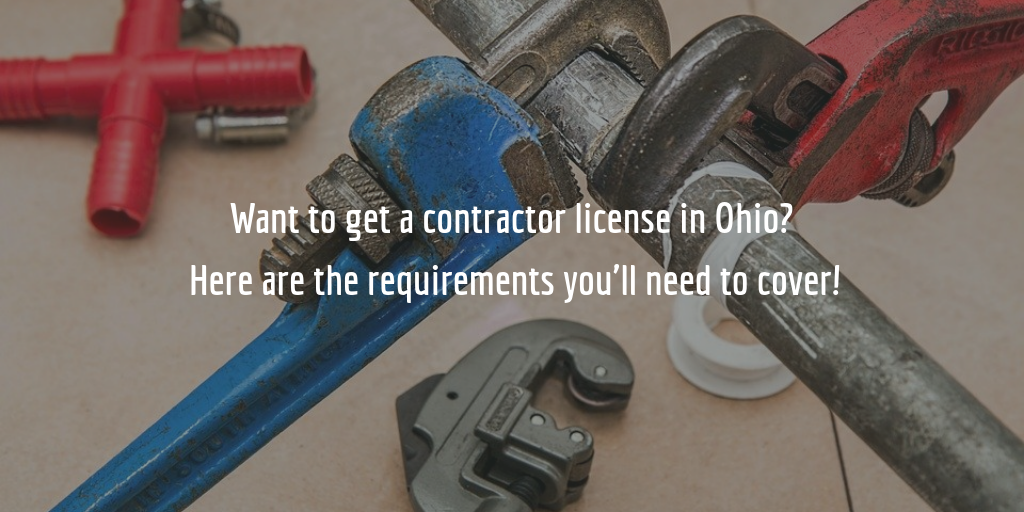How to Get an Ohio Contractor License [Guide]

Operating as a contractor in the state of Ohio will require you to obtain a license. There is no general state contractor license in Ohio.
Instead, you can get an electrical, plumbing, HVAC, hydronics, and refrigeration license from the Ohio Construction Industry Licensing Board (OCILB).
To operate as a general contractor, you will need to get licensed on the city level. Some of the cities that currently require contractors to get licensed are Cleveland, Columbus, the City of North Canton, the City of Warrenville, and the City of Springfield.
Common licensing requirements include obtaining liability insurance, providing proof of experience and of having passed an examination, and getting an Ohio contractor license bond.
Want to know how to get an Ohio contractor license? See our guide below!
1. Ohio Contractor License Types
To operate as an electrical, plumbing, HVAC, refrigeration or hydronics contractor on the state level, you will need to apply at the OCIBL.
Cleveland: To work as a general contractor, HVAC, plumbing, electrical, demolition, or sewer builder contractor in the City of Cleveland, you need to apply at the city Department of Building and Housing.
Columbus: To get a general, home improvement, demolition, sewer water or fire contractor license in the City of Columbus, you must submit an application to the city Department of Building and Zoning Services.
City of North Canton: To get a contractor registration in the City of North Canton, you must apply to the city’s Building & Permits Department.
Springfield: For a contractor license in the City of Springfield, you must apply at the city’s Department of Community Development, Division of Building Regulations office.
Warrenville: To perform work as a general contractor in the City of Warrenville, you will need to apply to the city’s Community Development Department Building Division.
2. Register Your Business in the State
Before you can apply for a contractor license, you will be required to register your business with the Secretary of State. This includes your business entity registration as well as your trade name registration.
If you plan on having employees, you will also need to obtain a federal Employer Identification Number (EIN) from the Internal Revenue Service. Once you have an EIN, you will also need to register with the Ohio Department of Taxation.
Once you’ve covered the above requirements, you can proceed with applying for your state or city Ohio contractor license.
3. Cover the Ohio Contractor License Requirements
Both licenses issued on a state level as well as those issued on a city level include a number of requirements that applicants must comply with. These are frequently quite similar, despite the licenses being issued by different licensing authorities.
Below you will find links to the application pages for all license types listed under #1 above. Frequent licensing requirements for Ohio contractor licenses include:
- Completing your Ohio contractor license application
- Providing proof of experience in the trade you are applying for and/or providing proof of having passed an exam in your trade
- Submitting a surety bond and liability insurance
- Obtaining workers’ compensation insurance (if applicable)
- Paying an application and/or registration fee
Typically, the specific requirements for your license type will be listed on your application form. See the list of links below to find the license application which you require:
- Ohio Construction Industry Licensing Board (OCILB) application requirements and forms for a state electrical, plumbing, HVAC, refrigeration or hydronics contractor license
- City of Cleveland contractor registration forms
- City of Columbus contractor licensing and registration forms
- City of North Canton contractor registration and permit forms
- City of Springfield contractor license form
- City of Warrenville contractor permit application
4. Ohio Contractor License Bond Requirements
There are varying bond requirements for the different contractor licenses across the state. With the exception of applicants with the OCILB on the state level, most contractors must post an Ohio contractor license bond. Following is a list of some of the bond amounts for contractors in Ohio.
- Columbus – $25,000 for all types of contractors
- Cleveland – $25,000 for all types of contractors
- City of North Canton – $10,000 bond
- City of Springfield – $10,000 bond
- City of Warrenville – $5,000 bond
The purpose of contractor license bonds is to guarantee that a contractor will comply with state and local rules and regulations. If a licensed and bonded contractor violates their obligations, a claim can be filed against their bond to secure financial compensation.
You can get a free quote on your bond by completing the short bond form below!

5. Renewing Your Ohio Contractor License
Contractor licenses must typically be renewed yearly. You will likely be informed by the licensing authority in your city when your license is about to expire but it is a good thing to keep it in mind yourself.
Usually, renewing your license includes submitting a renewal application form, providing a new surety bond and insurance policy, proof of continuing education (if required).
If you have any questions about getting one of the licenses above, contact the licensing authority which is responsible for regulating and issuing them.



